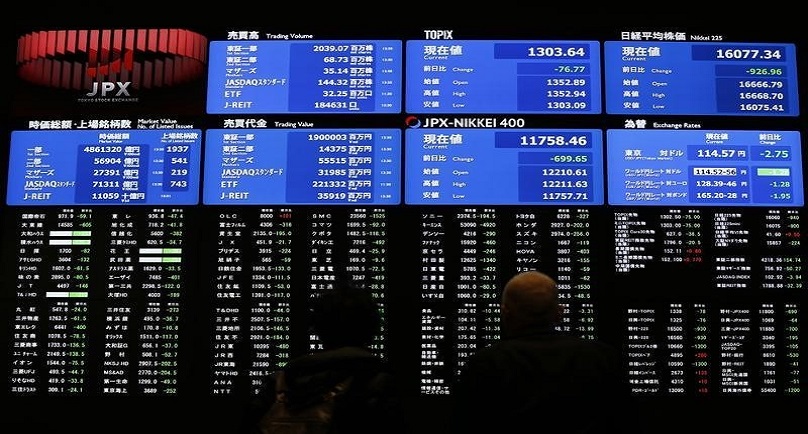Image: Visitors looks at an electronic board showing the Japan’s Nikkei average (top R) at the Tokyo Stock Exchange (TSE) in Tokyo, Japan, February 9, 2016. REUTERS/Issei Kato
By Wayne Cole
SYDNEY (Reuters) – Asian shares were taking a breather on Wednesday after two sessions of solid gains, while oil prices swung higher as the market reconsidered the chances of a meaningful deal to restrict supply later in the year.
The mood was still skittish – when China set a slightly lower guidance rate for its yuan, the yen and safe-haven bonds got an instant boost. As investors realized this was not some message from Beijing on devaluation, the moves quickly reversed.
Yet nerves had settled enough for stocks to make some modest gains. MSCI’s broadest index of Asia-Pacific shares outside Japan edged up 0.2 percent, having climbed 3 percent over the previous two sessions.
The Shanghai Composite Index gained 0.6 percent and South Korea 0.2 percent. Japan’s Nikkei eased 0.2 percent, but is still up more than 7 percent on the week.
E-Mini futures for the S&P 500 firmed 0.2 percent after Wall Street broke its negative feedback loop with oil.
The Dow ended Tuesday with gains of 1.39 percent, while the S&P 500 <.SPX> added 1.65 percent and the Nasdaq 2.27 percent. [.N]
A survey of global fund managers found they had become so cautious they were holding more cash than at any time since late 2001, an “unambiguous buy” signal according to Bank of America Merrill Lynch.
MOOD SWINGS
In commodity markets, oil was whipsawed after top exporters, Russia and Saudi Arabia, agreed to freeze output levels but said the deal was contingent on other producers joining in.
After falling sharply at first, prices recouped some ground early on Wednesday. Brent added 40 cents to $32.58, while U.S. crude was up 19 cents at $29.23 a barrel.
“Albeit mostly symbolic, it is one of the first clear acknowledgments by the oil heavyweights that all is not entirely well in the current price environment,” wrote Helima Croft, global head of commodity strategy at RBC Capital Markets.
“Additionally it’signals a potential willingness to be more proactive later in the year. It puts the ball back in the court of those who would not or could not comply.”
Markets now await minutes of the Federal Reserve’s last meeting to judge the balance of opinion among policymakers on the prospect of further rate hikes.
Boston Fed President Eric Rosengren certainly sounded in no hurry to tighten. Speaking late on Tuesday, Rosengren said the Fed would need to ratchet down economic forecasts it made in December because of the uncertain global outlook.
Doubts about the pace of any further hikes kept the U.S. dollar restrained at 96.871 against a basket of currencies. It was steady on the yen at 114.05, after finding support around 113.60.
The big loser was sterling, which has struggled so far in 2016 because of worries the UK might leave the euro zone.
Traders said UK markets face a pivotal week ahead of a two-day summit’starting on Thursday at which Prime Minister David Cameron will try to persuade other leaders to support a deal to keep Britain in the European Union.
Sterling was stuck at $1.4300, having shed 1 percent against the dollar on Tuesday.
(Reporting by Wayne Cole; Editing by Shri Navaratnam and Jacqueline Wong)
Copyright 2015 Thomson Reuters. Click for Restrictions.


